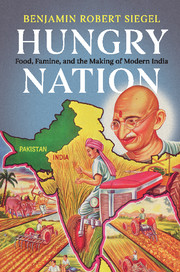Crossref Citations
This Book has been
cited by the following publications. This list is generated based on data provided by Crossref.
Berger, Rachel
2018.
Alimentary Affairs: Historicizing food in modern India.
History Compass,
Vol. 16,
Issue. 2,
Ansari, Sarah
and
Gould, William
2019.
Boundaries of Belonging.
Ankit, Rakesh
2019.
In the hands of a ‘secular state’: Meos in the aftermath of Partition, 1947–49.
The Indian Economic & Social History Review,
Vol. 56,
Issue. 4,
p.
457.
Kamenov, Nikolay
2019.
Imperial cooperative experiments and global market capitalism,c.1900–c.1960.
Journal of Global History,
Vol. 14,
Issue. 2,
p.
219.
Stone, Glenn Davis
2019.
Commentary: New histories of the Indian Green Revolution.
The Geographical Journal,
Vol. 185,
Issue. 2,
p.
243.
Kumar, Prakash
2020.
“Modernization” and Agrarian Development in India, 1912–52.
The Journal of Asian Studies,
Vol. 79,
Issue. 3,
p.
633.
Montenegro de Wit, Maywa
Kapuscinski, Anne R.
and
Fitting, Elizabeth
2020.
Democratizing CRISPR? Stories, practices, and politics of science and governance on the agricultural gene editing frontier.
Elementa: Science of the Anthropocene,
Vol. 8,
Issue. ,
Montefrio, Marvin Joseph Fonacier
and
Wilk, Richard
2020.
Transecting “healthy” and “sustainable” food in the Asia Pacific.
Food, Culture & Society,
Vol. 23,
Issue. 2,
p.
102.
FENNELL, SHAILAJA
2020.
MALTHUS, STATISTICS, AND THE STATE OF INDIAN AGRICULTURE.
The Historical Journal,
Vol. 63,
Issue. 1,
p.
159.
Durbach, Nadja
2020.
Many Mouths.
Brown, Trent
2020.
When food regimes become hegemonic: Agrarian India through a Gramscian lens.
Journal of Agrarian Change,
Vol. 20,
Issue. 1,
p.
188.
SARKAR, ABHIJIT
2020.
Fed by Famine: The Hindu Mahasabha's politics of religion, caste, and relief in response to the Great Bengal Famine, 1943–1944.
Modern Asian Studies,
Vol. 54,
Issue. 6,
p.
2022.
Gupta, Diya
2020.
Bodies in Hunger: Literary Representations of the Indian Home-Front During World War II.
Journal of War & Culture Studies,
Vol. 13,
Issue. 2,
p.
196.
Kantor, Hayden S.
2020.
Locating the Farmer: Ideologies of Agricultural Labor in Bihar, India.
Anthropology of Work Review,
Vol. 41,
Issue. 2,
p.
97.
Cohen, Amy J.
and
Jackson, Jason
2020.
Governing Through Markets: Multinational Firms in the Bazaar Economy.
SSRN Electronic Journal ,
Ankit, Rakesh
2020.
Bearing ‘financial responsibility’ for the Government and the Party: C.D. Deshmukh (1950–56) & T.T. Krishnamachari (1956–58).
Commonwealth & Comparative Politics,
Vol. 58,
Issue. 4,
p.
476.
Shutzer, Matthew
2020.
Energy in South Asian history.
History Compass,
Vol. 18,
Issue. 12,
Ankit, Rakesh
2020.
Dr. John Matthai (1886–1959): between ‘Bombay Plan’ and ‘Planning Commission’.
Contemporary South Asia,
Vol. 28,
Issue. 1,
p.
43.
Sivaramakrishnan, K.
2021.
Social Structures and Spatial Alignments of Agrarian Urbanisation.
Urbanisation,
Vol. 6,
Issue. 1,
p.
113.
2021.
At the Limits of Cure.
p.
209.



